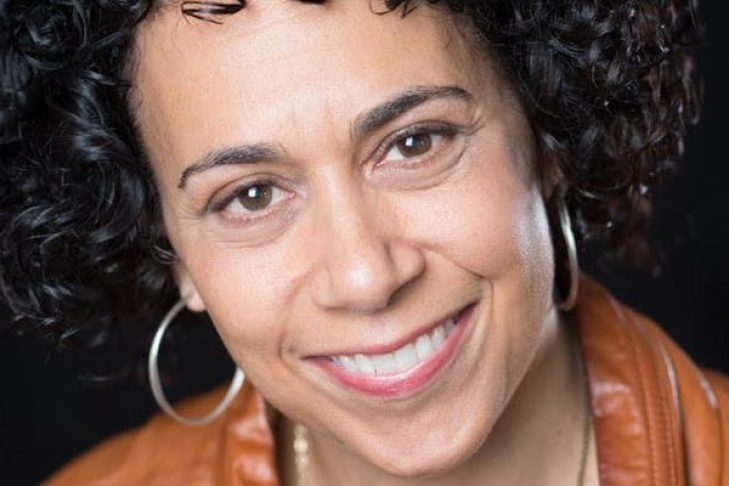A creative non-fiction writer and museum professional for over two decades, Sari Boren’s two worlds have come together in her work as a playwright. Boren’s solo play, “Exhibiting,” will debut the weekend of April 26 at Newton Theatre Company. It’s a drama that focuses on Boren’s expertise as a content developer who cultivates storylines and writes the text for mainly historical exhibits, and her experience as a second-generation, or “2G,” Holocaust survivor. Boren’s parents were imprisoned in concentration camps during World War II.
Boren recently spoke to JewishBoston about the writing, producing and performing of “Exhibiting,” as well as some of the themes she explores as a creative non-fiction writer. “Several of my essays,” she noted, “are memoir-based and are about my family’s history in the Holocaust. It’s my way of grappling with that history. Some of my essays have recently moved on from straight memoir and are more research-based. I integrate things going on in the world with the lens of my experience as the daughter of survivors.”
Melissa Bernstein, founder and artistic director of Newton Theatre Company and a childhood friend of Boren’s, had been encouraging her to write a solo play based on her essays for years. “I told Sari her essays could be the basis of a one-person play,” Bernstein told JewishBoston. “There’s a resonant line in the play in which Sari asks, ‘When did I know about the Holocaust?’ Her mother answers, ‘You always knew.’ I always knew Sari’s story in a poignant, moving way.”
Bernstein’s prompting sent Boren on “an investigation of playwriting. Melissa got me excited about the idea of writing a play. I printed out the essays that were memoir in nature and laid them out on a table. I color-coded them so I could cut them up and come up with a structure.” The two women created a fictional construct that Boren described as “launching the rest of the play. It’s a frame that holds things together and goes to the whole story of being a child of survivors.”
Writing about her survivor parents initially gave Boren pause. “I wondered how much of this story was mine to tell?” she said. “I didn’t want to exploit my family’s story for my own gain.” Bernstein said that although Boren is the child of Holocaust survivors, “This is not a sentimental play or her eliciting sympathy. ‘Exhibiting’ is partly about why Sari can’t read her father’s published book about his experiences in the Holocaust. It’s a pressing question she has made as one of the themes of her play. It’s a dramatic question with an arc.”
While Boren maintains boundaries so as not to “overtly leverage her parents’ stories,” she nevertheless writes on pertinent topics as the child of survivors. A published essay called “The Slurry Wall” talks about an artifact in the 9/11 Museum in New York City. The “slurry wall” refers to a retaining wall that withstood the impact of a plane crashing into one of the towers. The essay is also a rejoinder to architect Daniel Libeskind’s statement: “The most dramatic part of the Trade Center to survive the attack was the great slurry wall, an engineering wonder constructed on bedrock to hold back the Hudson River. Somehow, it had withstood the unimaginable trauma of the twin towers’ destruction, asserting, as eloquently as the Constitution, the durability of democracy and the value of human life.”
Boren asserted that Libeskind, also a second-generation Holocaust survivor, made an “inauthentic statement” about the artifact. “There was a lot of public hyperbole going on about that 9/11 artifact, and I had many feelings about it,” she said. “The fact that my parents are survivors comes up in the essay, but it’s not a Holocaust essay. It’s an essay about the hyperbole of remembrance—of placing and imposing meaning onto an artifact that it doesn’t deserve. Doing that was a way of avoiding questions around the 9/11 Museum, such as how will democracy withstand the strains of terrorism?”
In addition to “Exhibiting,” Boren has a 10-minute play called “To Rest” in the Somerville Theater Festival, also running the last weekend in April. She described the work as a “fictional play told through the lens of my museum work. It’s set at a pop-up memorial after a mass shooting. Two strangers meet at the memorial. One of them brings a teddy bear and the other a crowbar. They each have different beliefs about who and what belongs at the memorial.”
Boren is also part of the Boston-based Company One Theatre’s PlayLab. She described the play lab as space for her to workshop new material. She plans to write a more expanded version of “To Rest.”
As for “Exhibiting,” Boren sees the play as a capstone piece. “It brings together my essays about my family,” she said. “Being a child of survivors is one of my lenses, and I’m wrapping up that story. Working with Melissa on the play—a person whom I trust so much—has been profoundly satisfying. Writing and performing ‘Exhibiting’ has been one of the highlights of my career. I never wanted to write an entire memoir, and this play enables me to tell a story that I need to present.”



